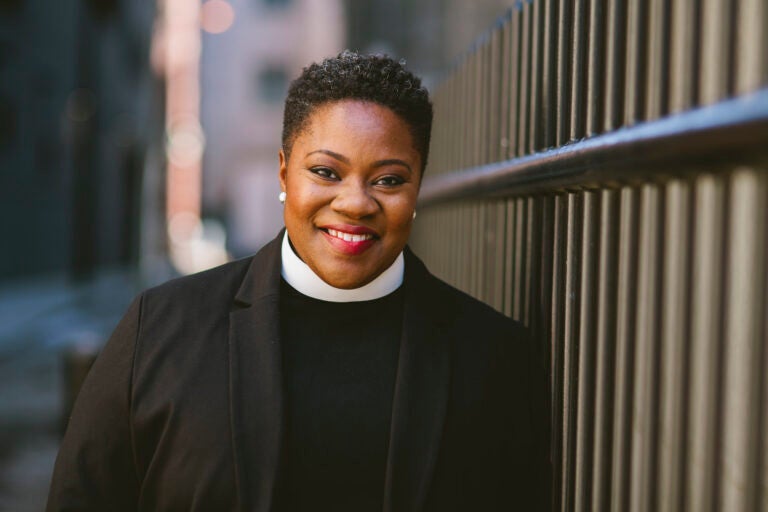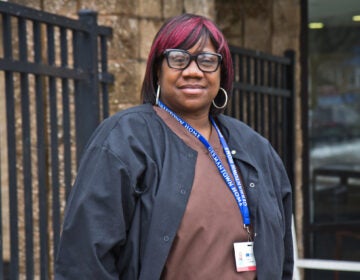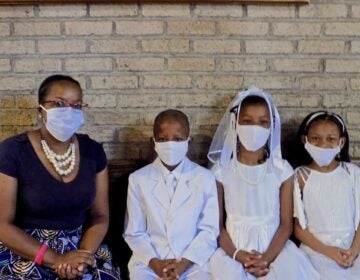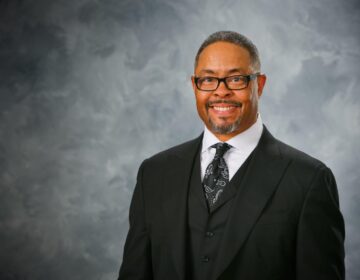Philly interfaith leader discusses the toll COVID has taken on congregations
Morning Edition host Jennifer Lynn speaks with Rev. Naomi Washington-Leapheart, Philadelphia’s director for Faith-Based and Interfaith Affairs.
Listen 6:40
Rev. Naomi Washington-Leapheart, Philadelphia’s director for Faith-Based and Interfaith Affairs. (City of Philadelphia)
In the last year, the coronavirus pandemic has had a profound impact on places of worship.
Morning Edition host Jennifer Lynn spoke with the Rev. Naomi Washington-Leapheart. She’s Philadelphia’s director for Faith-Based and Interfaith Affairs.
The reverend has watched congregations answer the call for personal protective equipment, childcare, and emergency meals. She says it’s only natural some churches are partnering with health officials to advocate for and administer COVID-19 vaccines.
___
You know, I think that there have always been organizations and individuals who stand in the gap. If the system is not providing what people need in a timely and dignified way, then people step up and say, “We cannot wait for people to see the light, to be convinced that folks deserve more attention because of the history of disenfranchisement, we cannot wait for institutions to course-correct.”
You’ve seen churches standing in the gap?
Yes.
Whether it comes to messaging about the importance of taking the vaccine, some churches are working with health clinics to offer the vaccine.
Yes. I’ve from the beginning had congregations all over the city contacting me to say, how can we help? We’re not going to have worship, for example, in our building, but we have our building available. And so if you need a place for children to go, back in the early days of the pandemic when we were trying to figure out how to set up access centers and how to make sure students had a safe place to go while their parents were at work. Congregations were stepping up to the plate then. I think we’re seeing that same energy now that we have a vaccine and we need people to take the vaccine. One of the challenges we’ve had is how do we make vaccination both centrally located and located in neighborhoods so that people feel like, “I can go do this in a place where I feel safe. I feel known?”
Yes, safe and known and cared for physically and mentally. Right? I mean, this pandemic has been so hard on people.
Yeah. There have been studies done that show that people will go to their faith communities for psychological support and mental health care before they go to trained mental health professionals. I’m not suggesting people shouldn’t go to trained mental health professionals, but the congregation is often a portal through which people understand that their mental health care should be attended to just like any other health care that they need. The messages that go out via faith communities are impactful, and that’s why we got to make sure that faith communities have good information, have access to all of the phone numbers and websites and everything that we want people to use during this time.
Do you think the nationwide protests last year over George Floyd and other Black victims of police violence helped America more mindfully look at COVID through a lens of racial disparities, that people of color were more at risk of illness and poor outcomes?
I certainly think that the simultaneity of it all, it was the pressure cooker we needed. Do I want Floyd to still be alive? Yeah. Do I want Breonna Taylor and Ahmaud Arbery to still be alive? Yeah. I wish that their lives weren’t kind of the sacrifices that helped us see more clearly what was perhaps right in front of us the whole time. We can pay tribute to their lives by refusing to close our eyes again. The pot was boiling over this past summer, and I know that our response now to COVID has been impacted by what we were able to see.
Human-to-human connection is so important in faith communities. COVID breached that connection.
Social distancing has really shown us how desperately we need human touch and human connection. It’s a spiritual value to feel connected. And I’m here in Ohio for a family funeral and, we know we’re still in COVID and everybody is doing all of the precautionary things, but you just want to hold somebody as they cry. You want to wipe their tears away. You want to do all the things we’re not supposed to be doing, want to breathe the same air and all of this, all the stuff. And so we suffer spiritually when we’re not able to be tethered in the ways that feel natural to us. Even after the last case has been treated, we’re going to be reeling from this spiritually, I think, for a while.
Reverend, what is your prayer for all of us at this time? A year has passed since the beginning of the pandemic.
So I’ve been doing these prayer pauses spaces for reflection online and I’ve been ending the prayer pauses with this prayer: “May your burdens be more light each day. May the spirit soften your heartache. May your struggles end so you can dream. May your bad days prove that you are loved. May your whole life prove that God is love.”
That’s lovely. Thank you for sharing that. Reverend Naomi Washington-Leaphart, thank you for your time.
Thank you. Thank you. I’m glad we got a chance to talk.

Get daily updates from WHYY News!
WHYY is your source for fact-based, in-depth journalism and information. As a nonprofit organization, we rely on financial support from readers like you. Please give today.





![CoronavirusPandemic_1024x512[1]](https://whyy.org/wp-content/uploads/2020/03/CoronavirusPandemic_1024x5121-300x150.jpg)


